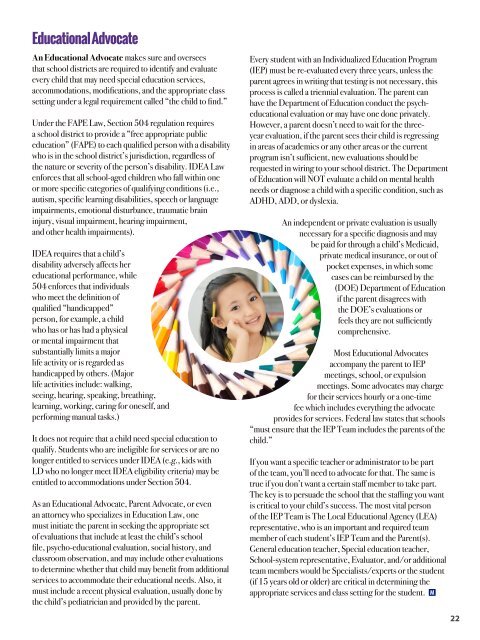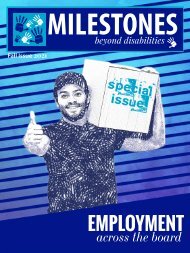Milestones Spring Issue 2022
Helping Individuals with Disabilities & their Families Achieve & Celebrate Events & Milestones in their Lives
Helping Individuals with Disabilities & their Families Achieve & Celebrate Events & Milestones in their Lives
Create successful ePaper yourself
Turn your PDF publications into a flip-book with our unique Google optimized e-Paper software.
Educational Advocate<br />
An Educational Advocate makes sure and oversees<br />
that school districts are required to identify and evaluate<br />
every child that may need special education services,<br />
accommodations, modifications, and the appropriate class<br />
setting under a legal requirement called “the child to find.”<br />
Every student with an Individualized Education Program<br />
(IEP) must be re-evaluated every three years, unless the<br />
parent agrees in writing that testing is not necessary, this<br />
process is called a triennial evaluation. The parent can<br />
have the Department of Education conduct the psycheducational<br />
evaluation or may have one done privately.<br />
Under the FAPE Law, Section 504 regulation requires<br />
a school district to provide a “free appropriate public<br />
education” (FAPE) to each qualified person with a disability<br />
who is in the school district’s jurisdiction, regardless of<br />
the nature or severity of the person’s disability. IDEA Law<br />
enforces that all school-aged children who fall within one<br />
or more specific categories of qualifying conditions (i.e.,<br />
autism, specific learning disabilities, speech or language<br />
However, a parent doesn’t need to wait for the threeyear<br />
evaluation, if the parent sees their child is regressing<br />
in areas of academics or any other areas or the current<br />
program isn’t sufficient, new evaluations should be<br />
requested in wiring to your school district. The Department<br />
of Education will NOT evaluate a child on mental health<br />
needs or diagnose a child with a specific condition, such as<br />
ADHD, ADD, or dyslexia.<br />
impairments, emotional disturbance, traumatic brain<br />
injury, visual impairment, hearing impairment,<br />
and other health impairments).<br />
An independent or private evaluation is usually<br />
necessary for a specific diagnosis and may<br />
be paid for through a child’s Medicaid,<br />
IDEA requires that a child’s<br />
disability adversely affects her<br />
educational performance, while<br />
504 enforces that individuals<br />
who meet the definition of<br />
qualified “handicapped”<br />
person, for example, a child<br />
who has or has had a physical<br />
private medical insurance, or out of<br />
pocket expenses, in which some<br />
cases can be reimbursed by the<br />
(DOE) Department of Education<br />
if the parent disagrees with<br />
the DOE’s evaluations or<br />
feels they are not sufficiently<br />
comprehensive.<br />
or mental impairment that<br />
substantially limits a major<br />
life activity or is regarded as<br />
handicapped by others. (Major<br />
life activities include: walking,<br />
seeing, hearing, speaking, breathing,<br />
learning, working, caring for oneself, and<br />
performing manual tasks.)<br />
Most Educational Advocates<br />
accompany the parent to IEP<br />
meetings, school, or expulsion<br />
meetings. Some advocates may charge<br />
for their services hourly or a one-time<br />
fee which includes everything the advocate<br />
provides for services. Federal law states that schools<br />
“must ensure that the IEP Team includes the parents of the<br />
It does not require that a child need special education to<br />
child.”<br />
qualify. Students who are ineligible for services or are no<br />
longer entitled to services under IDEA (e.g., kids with<br />
LD who no longer meet IDEA eligibility criteria) may be<br />
entitled to accommodations under Section 504.<br />
If you want a specific teacher or administrator to be part<br />
of the team, you’ll need to advocate for that. The same is<br />
true if you don’t want a certain staff member to take part.<br />
The key is to persuade the school that the staffing you want<br />
As an Educational Advocate, Parent Advocate, or even<br />
an attorney who specializes in Education Law, one<br />
must initiate the parent in seeking the appropriate set<br />
of evaluations that include at least the child’s school<br />
file, psycho-educational evaluation, social history, and<br />
classroom observation, and may include other evaluations<br />
to determine whether that child may benefit from additional<br />
services to accommodate their educational needs. Also, it<br />
is critical to your child’s success. The most vital person<br />
of the IEP Team is The Local Educational Agency (LEA)<br />
representative, who is an important and required team<br />
member of each student’s IEP Team and the Parent(s).<br />
General education teacher, Special education teacher,<br />
School-system representative, Evaluator, and/or additional<br />
team members would be Specialists/experts or the student<br />
(if 15 years old or older) are critical in determining the<br />
must include a recent physical evaluation, usually done by<br />
the child’s pediatrician and provided by the parent.<br />
appropriate services and class setting for the student.<br />
M<br />
22











